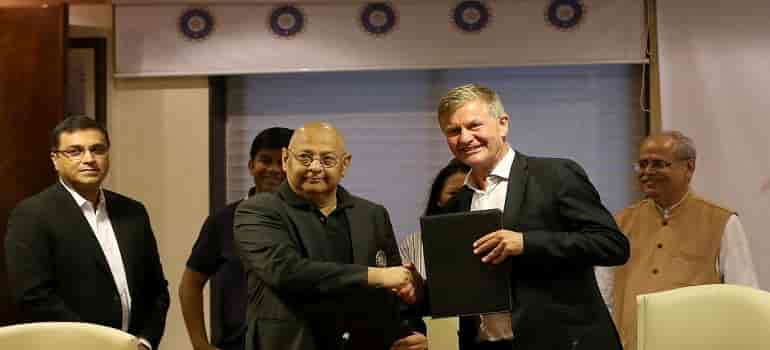 Ahead of the final Cricket match of 2018 Indian Premier League, between Chennai Super Kings and Sunrisers Hyderabad, the Board of Control for Cricket in India (BCCI) and UN Environment signed an agreement to ‘green’ cricket in India. BCCI will endeavor to reduce their environmental impact by greening operations and engaging fans and cricketers in green initiatives.
Ahead of the final Cricket match of 2018 Indian Premier League, between Chennai Super Kings and Sunrisers Hyderabad, the Board of Control for Cricket in India (BCCI) and UN Environment signed an agreement to ‘green’ cricket in India. BCCI will endeavor to reduce their environmental impact by greening operations and engaging fans and cricketers in green initiatives.
Amitabh Choudhary, Acting Secretary of the BCCI, and Erik Solheim, Executive Director of UN Environment signed a letter of intent at the offices of Board of Control for Cricket in India.
Commenting on the initiative, Choudhary said: “The Board is happy to announce its partnership with UN Environment. This is a major step in spreading the message of environmental conservation. We will help make cricket green and sensitize spectators towards minimizing waste generation during matches.”
“The environment and sports are more closely connected than people think. If we don’t have a healthy environment, then sports will not thrive” says mr. Solheim. “ I am delighted that UN Environment is partnering with the Board of Control for Cricket in India, to use the power of cricket to inspire action for the environment and this planet,” he added.
Cricket is one of the most widely played and watched sports in the country, reaching millions of homes across the country and world. The partnership aims to spread greater awareness about key environmental challenges facing the country, and highlight alternate and more sustainable solutions.
In the time it takes Hardik Pandya to bowl an over in cricket, four garbage trucks of plastic are dumped into the ocean. The partnership will also focus on phasing out single-use plastic across stadiums and cricket events in the country. BCCI has already begun raising awareness on this issue. At the recent IPL matches, a film was developed and aired in stadiums on plastic pollution containing messages from the captains of various teams.
As global host of World Environment Day in 2018, India is leading the global charge to #BeatPlasticPollution in the country, and around the world. It is estimated that the world uses 10 million plastic bags every minute, and much of ends up in our oceans and landfills and is ingested by marine animals and wildlife.
Cricket teams are already taking steps to a green future. In Indore, the city implemented a Green Protocol, based on the concept of 3Rs – to reduce, reuse and recycle, in all four Indian Premier League matches played at the Holkar Stadium. A plastic audit is being undertaken at the Stadium to assess the types and volumes of single-use plastic generated, and chart a course to implement waste management systems accordingly. Similarly, in Bengaluru, the Karnataka Cricket Association and IPL teams have replaced plastic cups and bottles, with environment-friendly alternatives for over 32,000 fans at the Chinnaswamy stadium.
In signing today’s agreement, the Board of Control for Cricket in India joins a growing league of sporting events looking to reduce its environmental footprint. English football club Tottenham Hotspur for example will phase out single-use plastics in its new stadium. In the United States, Adidas and Major League Soccer released special kits, made out of Parley Ocean Plastic, for matches played during the weekend of Earth Day. All 23 clubs wore shirts made from technical yarns created from plastic waste found on beaches and in coastal communities. Also add International Olympic Associations joining Clean Seas and MCC ground to be plastic free ion three years


